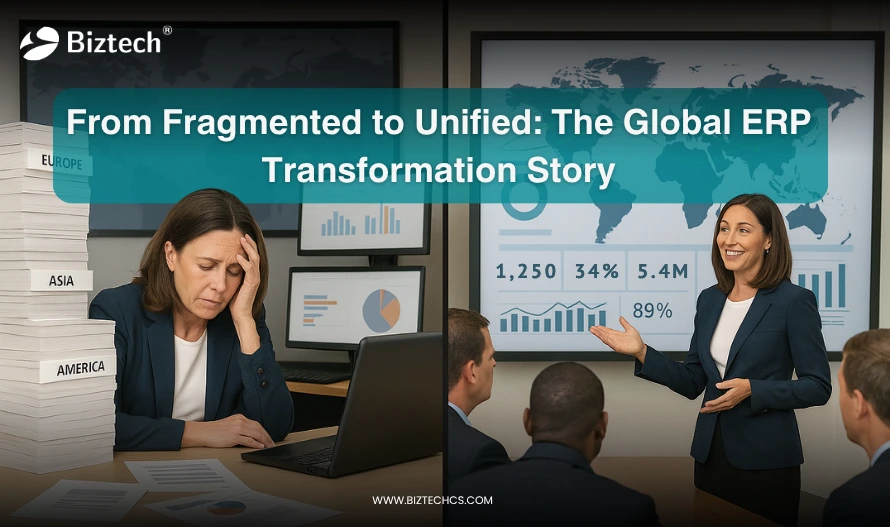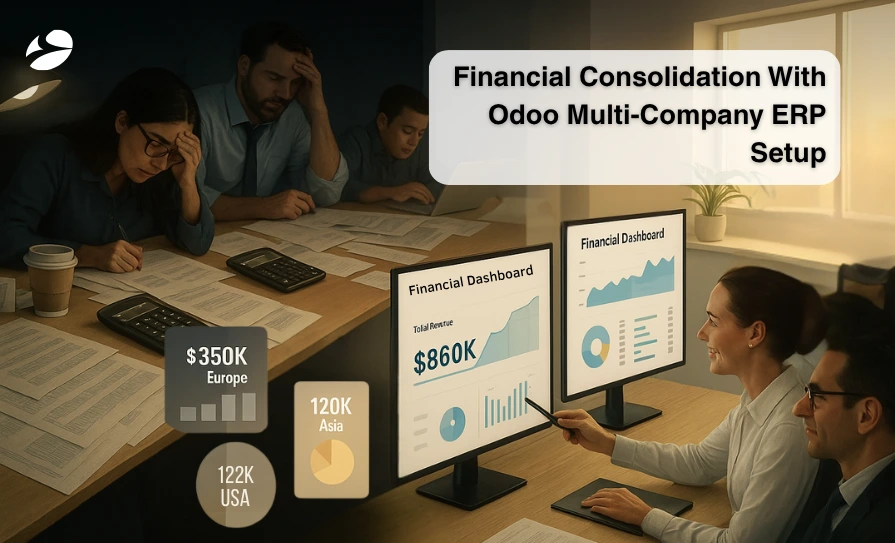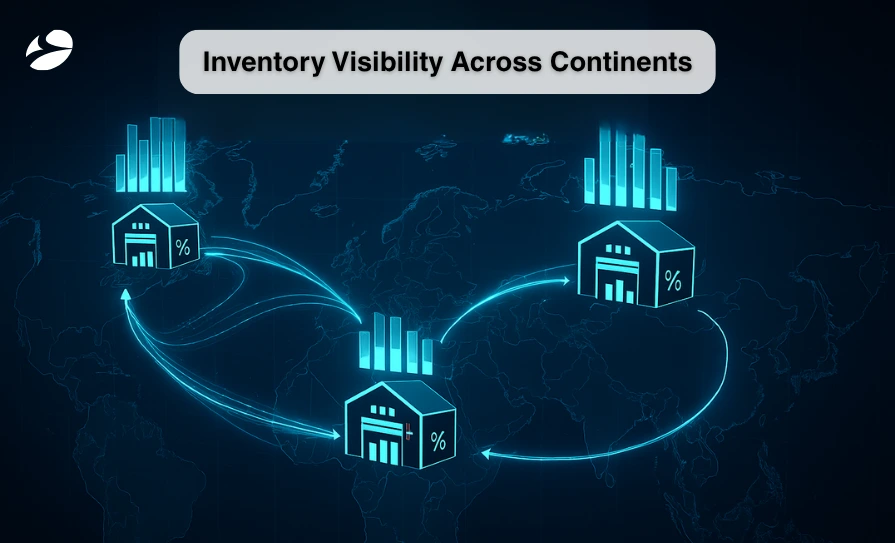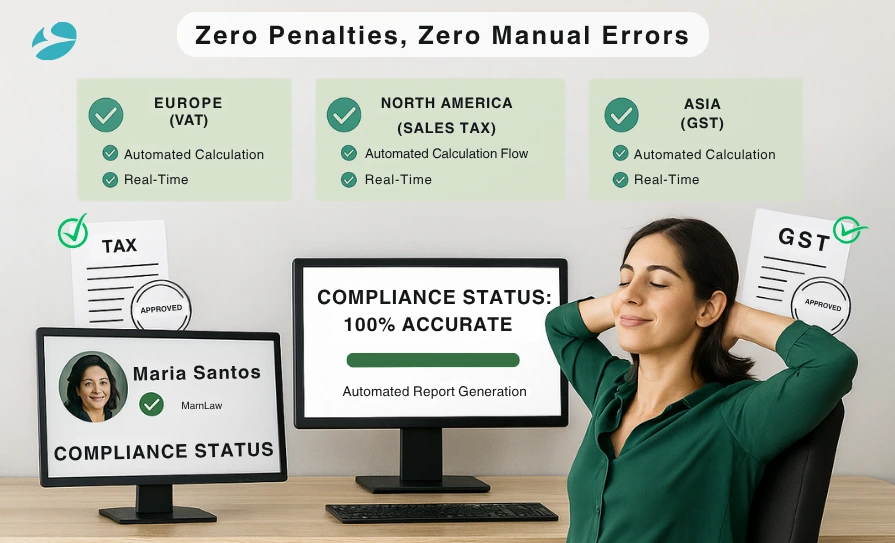How a Global Enterprise Cut Financial Reporting Time in Half with Smart Multi-Company ERP Strategy?
5 min read
5 min read

The CFO, Sarah Martinez of a global enterprise, had been staring at the same pile of regional reports for two hours. North America looked solid for Q3, but something wasn’t adding up with the European numbers. Their inventory reports didn’t match the financial data, and Asia was running three days behind on their monthly submissions again.
She remembered the board meeting from last quarter. The delayed financial consolidation had cost them a major merger opportunity. The CEO had been clear: “We can’t keep operating like three different companies when we’re supposed to be one unified global organization.”
The breaking point came on a Tuesday morning. Tom Rodriguez, the North American procurement manager, called Sarah with urgent news about inventory discrepancies.
“Sarah, we’ve got a problem. Our system shows the European warehouse has 50,000 units of Component X. But when our Texas facility tried to request a transfer, the warehouse responded they only have 23,000 units available.”
This wasn’t the first time. Over six months, similar issues kept surfacing,
At this point, one of the regional directors asked: “If we’re losing visibility and accuracy at this scale, how can we expect our teams to make confident operational decisions day-to-day?” The answer was clear: without a unified ERP system, every decision was being made on incomplete or outdated data. The result wasn’t just delays—it was lost opportunities and costly errors.
In fact, 42% of finance professionals identified manual reconciliation as a major pain point, contributing to errors and inefficiencies in financial reporting (source). On a leadership call, Sarah finally voiced the frustration everyone felt: “How much longer can we afford to waste weeks reconciling numbers when our competitors are closing deals in days? The truth was unavoidable: the cost of inaction was greater than the cost of transformation. Every delayed consolidation slowed decisions and created lost opportunities in the market.
That’s when the board brought in BiztechCS to create a unified global ERP solution with Odoo ERP development, designed to centralize control while preserving regional flexibility. The project looked straightforward on paper, but coordinating technology, processes, and people across multiple time zones and regulatory environments requires specialized expertise. This is exactly where BiztechCS excels, bringing deep experience in managing complex multinational ERP transformations.
Ready to explore how unified ERP operations could transform your multi-regional business? Let’s discuss your specific challenges and map out a phased transformation approach that works for your organization.
BiztechCS started with the company’s biggest headache: Financial consolidation. The Odoo multi-company ERP setup would become the foundation for everything else.
During the initial planning session, Sarah raised a critical concern: “Can we actually generate global financial reports while keeping our local accounting practices intact? Europe needs IFRS compliance, the US follows GAAP, and Asia has its own regulatory requirements.”
This question highlighted exactly why multi-company financial consolidation in Odoo needed careful planning. The system had to be flexible enough for different accounting standards while robust enough to generate unified reports.
Especially for global enterprises, multi-currency reconciliations with multi-currency transactions is a primary requirement. So further the scope, BiztechCS proactively recommended implementing Odoo cross-border transactions management functionality to build a scalable robust system.
At that point, another board member followed up with an equally important question: “Will this system give us the agility to integrate future acquisitions without starting from scratch every time?” BiztechCS confirmed this was one of the key advantages of Odoo’s multi-company setup.
Another board member followed with a pointed question: “If we align under one system, do we risk slowing down regional teams that are already under pressure from compliance workloads?” BiztechCS reassured them that this risk was exactly why the transformation was phased. By starting with financial consolidation and building region by region, the project ensured teams would adopt the system without overwhelming their existing responsibilities.
Another director leaned in with a related concern: “If we make this shift, how do we avoid overwhelming regional finance teams that are already stretched thin?” BiztechCS addressed this by emphasizing the phased rollout strategy. Instead of forcing all regions to adapt overnight, the transformation was sequenced—starting with financial consolidation, then inventory, and finally compliance. This staged approach gave each region the breathing room to adopt new practices without disrupting daily operations. The training sessions were designed to fit into existing workloads, ensuring adoption didn’t come at the cost of burnout.
By building a scalable foundation, the ERP wouldn’t just solve current problems but also future-proof the company’s growth strategy.

BiztechCS configured Odoo’s multi-company functionality to create separate charts of accounts for each region while maintaining the ability to consolidate financial data at the corporate level. Each branch could keep its local accounting practices while feeding into a global financial picture.
Results started showing within the first month. Klaus reported from Europe: “For the first time in years, I can see our North American receivables when making credit decisions for global customers. The visibility is changing how we operate.”
He added: “We regularly encounter clients asking: Do your regional teams have visibility into each other’s financial performance? How often do you discover discrepancies between regional reports during consolidation? These questions help us identify the scope of transformation needed.”
The financial consolidation phase also revealed why change management matters so much. Regional teams initially worried about losing autonomy, but BiztechCS’s training program helped them understand how centralized visibility could actually enhance their local decision-making capabilities.
Odoo ERP Consultants Tip: During financial consolidation rollouts, configure Odoo’s user access rights carefully. Role-based permissions ensure that regional teams only see what’s relevant to them while still contributing to the global consolidation—balancing transparency with control.
With financial consolidation stabilized, BiztechCS moved to Phase 2: Implementing Odoo for managing multiple branches through integrated inventory and procurement processes. This phase would solve the inventory visibility problems that had been frustrating the company’s operations.
Janet Liu, the North American procurement manager, explained her daily frustration during the kickoff meeting: “Right now, I have to call or email each regional warehouse to check stock levels. By the time I get responses, customer requirements have usually changed.”
Hearing this, the COO asked: “What’s the real cost of this inefficiency? Are we measuring how much revenue or customer trust we’re losing because of outdated processes?” The analysis revealed significant losses, including missed customer commitments, excess inventory purchases, and eroded supplier negotiations. By quantifying the hidden costs, the leadership team saw clearly that change wasn’t just about efficiency; it was about competitiveness.

BiztechCS configured Odoo’s Inventory module to provide real-time visibility across all global locations. The system enabled automatic stock level monitoring, streamlined intercompany transfers, and standardized procurement processes across regions.
At that point, the COO asked a broader strategic question: “If we centralize inventory visibility, how do we ensure that regional teams don’t lose their autonomy in managing local suppliers?” This concern was addressed by ensuring that Odoo’s setup provided both global visibility and regional control. Regional managers kept authority over local supplier negotiations while also gaining insight into global contracts—achieving the right balance between oversight and flexibility.
Odoo Consultant Tip: When implementing Odoo for global inventory and cross-border transactions, begin with high-volume or frequently transferred products. This makes it easier for teams to understand the process and gain confidence in the new system before moving on to less frequently managed items.
The transformation was immediate and measurable. Within 30 days of the inventory module going live:
When we work with multinational clients, we often encounter this same question: How long does it currently take your team to get accurate inventory information from other regional locations? Are you making procurement decisions with incomplete global inventory data? These are the exact pain points that drove us to develop our phased inventory integration methodology.
The inventory integration also revealed cost optimization opportunities. Sarah discovered their European division had been ordering components at 15% higher prices while their Asian facility had excess inventory of the same items. “The lack of visibility was literally costing us money every month,” she realized.
BiztechCS implemented automated alerts for low-stock situations and established protocols for cross-border inventory optimization. The system now automatically suggests intercompany transfers when one region has excess inventory and another shows upcoming shortages.
What would faster, data-driven inventory decisions mean for your business? Reduced costs? Improved customer trust? The right ERP setup can deliver both.
The final phase tackled one of the most complex aspects of multinational operations: Local compliance and tax management. Each region operated under different tax regulations, and manual compliance processes were consuming significant resources while creating audit risks.
Maria Santos, the regional tax officer for European operations, described the transformation: “The automation of tax calculations and reporting has been a game-changer. We went from spending two weeks each month preparing VAT reports to having them generated automatically with utmost accuracy.”
BiztechCS leveraged Odoo’s localization features to configure automated tax calculations for each region:

Odoo Consultant Tip: Always keep Odoo’s localization modules updated and extend them with custom fiscal positions where needed. This ensures smooth adaptation to regulatory changes without requiring disruptive reconfigurations each time tax laws shift.
The compliance automation delivered results that exceeded expectations. The company achieved even better results. During the board review, Maria Santos was asked directly: “Can this system keep pace with fast-changing tax regulations, or will we be back to manual work when laws shift?” Her response was reassuring: with Odoo’s localization modules and BiztechCS’s proactive monitoring, updates to tax rules could be rolled out quickly without disrupting daily operations. Compliance automation wasn’t just about today’s accuracy—it was about tomorrow’s adaptability too.
At that point, the CFO raised a practical but pressing question: “What about audit readiness? Will the system give us the documentation trails auditors demand without adding extra work for our teams?” BiztechCS confirmed that Odoo’s automated compliance setup generated audit-ready records as part of everyday operations. Every transaction, tax filing, and adjustment was logged with full traceability, meaning auditors could pull detailed records instantly. This not only reduced audit preparation time but also reassured leadership that compliance risks were minimized year-round.
This success prompted BiztechCS to ask the question we pose to all our multinational clients: “How much time do your regional teams spend on tax calculations and compliance reporting? Are you confident in the accuracy of manual tax processes across different jurisdictions?”
The answers to this often reveal significant opportunities for automation and risk reduction.
The automated compliance system provided unexpected benefits beyond time savings. Regional managers could now access real-time compliance status dashboards, enabling proactive management of tax obligations rather than reactive scrambling during filing periods.
Klaus from the European division noted: “Before Odoo, we discovered compliance issues during year-end audits. Now, we catch and resolve potential problems in real-time throughout the year.”
Are compliance challenges eating up valuable time in your regional teams? Imagine reclaiming those hours for strategic initiatives instead of manual reporting. With automation, it’s possible.
The transformation results spoke for themselves within 90 days of full implementation:
Financial Reporting Efficiency: Reporting time reduced by 50% through automated consolidation and real-time reporting capabilities. What previously required two weeks of manual data compilation now took three days of review and analysis.
Cutting Inventory Waste: The biggest surprise came from inventory management. The company was spending 30% more than necessary on components because different regions couldn’t see what others had in stock. Once they could share inventory data, those unnecessary purchases stopped almost immediately.
No More Tax Headaches: Maria Santos in Europe put it best: “I used to fear tax season. Now our VAT filings are automatically accurate, and I haven’t had a single penalty or correction request since we went live.”
End of Manual Reconciliation: Remember those intercompany transactions that took Tom’s team nearly two weeks to sort out? They now happen automatically. No more spreadsheet battles or late-night calls between time zones trying to balance the books.
Three months after going live, Sarah stood in front of the board with a smile instead of stress lines. “Look, we didn’t just buy new software,” she told them. “We finally started operating like the global company we always said we were. And our regional teams actually have more control now, not less.”
A director leaned forward with a question: “Now that we’ve stabilized operations, what’s next? Can this system scale to support acquisitions or new regional expansions without another major overhaul?” Sarah confirmed that the scalable Odoo multi-company setup gave them exactly that flexibility—future acquisitions could be integrated quickly, turning what used to be a risk into an opportunity.
Another director followed up with a question: “Beyond time savings, what new opportunities can we now pursue that were impossible before?” Sarah’s answer was powerful: “For the first time, we can evaluate global expansion and acquisition opportunities with confidence. We can see how fast a new region would integrate into our system, which makes strategic moves far less risky.”
This is exactly the outcome BiztechCS strives for with every client. When we ask executives: “What would a 50% reduction in financial reporting time mean for your organization? How could your regional teams redirect that time toward strategic initiatives?” These questions often help our clients envision the transformational possibilities beyond just system implementation.
The success extended beyond operational metrics. Employee satisfaction surveys showed significant improvements in job satisfaction across regional finance and operations teams. By eliminating repetitive manual tasks, the Odoo multi-company ERP setup allowed team members to focus on analysis and strategic decision-making, enhancing both productivity and employee morale.
The results are clear—automation and centralized systems drive tremendous efficiencies. How could these types of improvements benefit your organization?
This transformation demonstrates how the right global ERP solution with Odoo ERP implementation can address the complex challenges of multinational operations while preserving regional autonomy. The phased implementation approach allowed the organization to build confidence and capabilities progressively rather than attempting a massive simultaneous overhaul.
The lessons learned from this journey apply broadly to multinational organizations:
After reviewing these lessons, one of the senior executives raised a practical concern: “How do we ensure our teams continue adopting and expanding these tools, instead of slipping back to old habits?” The answer lies in BiztechCS’s change management framework. Regular training, regional champions, and ongoing system optimization keep the ERP relevant, ensuring adoption grows stronger over time rather than fading after go-live.
BiztechCS has refined this approach through dozens of successful multinational implementations. The question we always explore with clients is: “Which of these areas represents the biggest pain point for your multinational operations?”
Sometimes identifying the starting point is the most important strategic decision, and that’s where our diagnostic expertise proves invaluable.
The transformation also positioned the company for future growth. With unified systems and processes, they could now evaluate acquisition opportunities with confidence, knowing new regions could be integrated efficiently into their existing Odoo for managing multiple branches.
Odoo Consultant Tip: When implementing Odoo globally, don’t underestimate the importance of change management. Each region has its own set of challenges and cultural nuances. Train your teams on the value of the new system and involve regional champions who can guide the transition. Odoo’s flexibility allows customization to meet local needs while ensuring a unified global process. Building these champions is a key factor in a successful, long-term ERP implementation.
Remember Sarah staring at those stacks of mismatched reports? Three months later, she was presenting consolidated global financials to the board with confidence. The transformation wasn’t magic. It was smart planning, the right technology, and a team that understood how multinational businesses actually work.
Maybe you’re dealing with the same headaches. Your European team can’t see what’s happening in Asia. Inventory transfers take forever to sort out. Tax compliance feels like a full-time job across different countries.
Here’s what we know: these problems don’t fix themselves. But they’re absolutely solvable.
Give us a call. Let’s talk about what’s keeping you up at night and figure out a plan that actually works for your business. No sales pitch, just real talk about real solutions.

Artificial Intelligence (AI)
38
By Nandeep Barochiya

Artificial Intelligence (AI)
49
By Uttam Jain

Artificial Intelligence (AI)
373
By Nandeep Barochiya